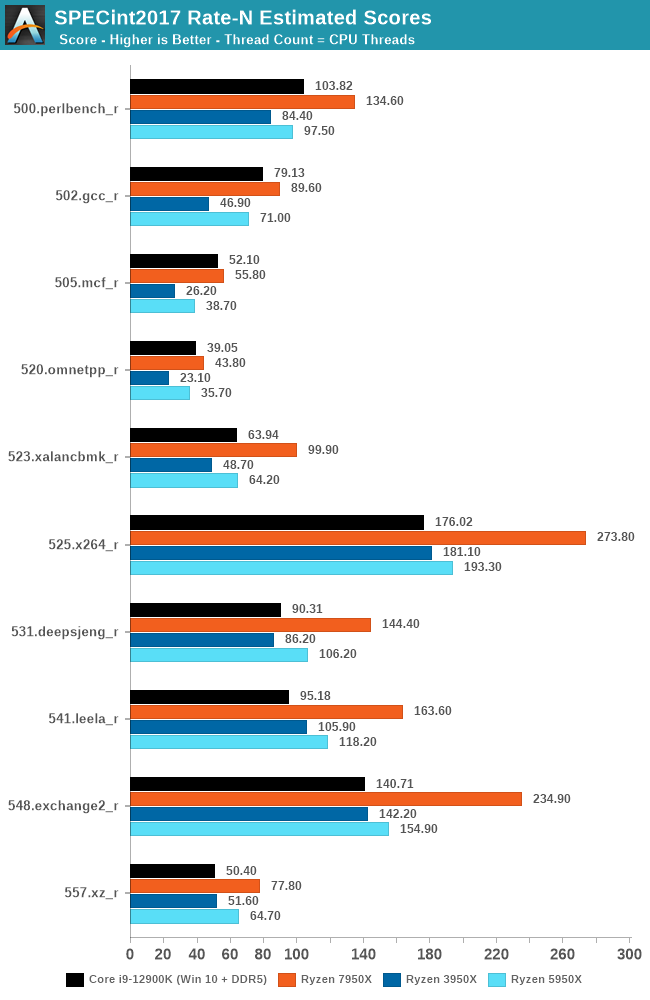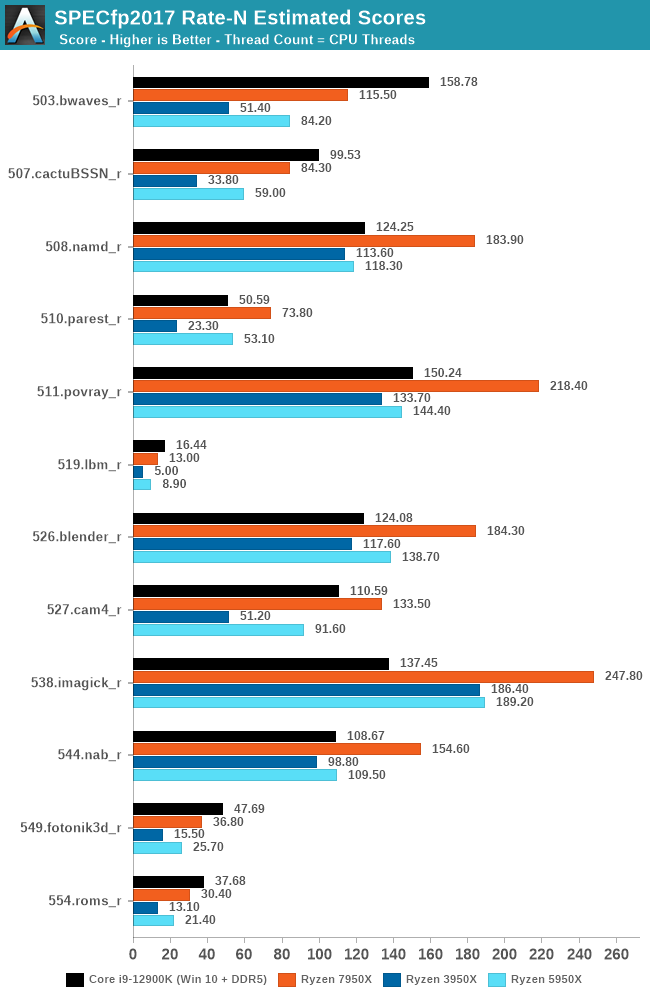AMD Zen 4 Ryzen 9 7950X and Ryzen 5 7600X Review: Retaking The High-End
by Ryan Smith & Gavin Bonshor on September 26, 2022 9:00 AM ESTSPEC2017 Multi-Threaded Results
Although single-threaded performance is important and Zen 4 has a clear advantage here, multi-threaded performance is also very important. Some variables to consider when evaluating multi-threaded performance is that desktop processor designs typically boost a single core higher, with the rest lagging in frequency behind to either stay under the thermal (TJMax) or power (TDP) envelopes. Some manufacturing processes are more efficient by design due to extensive R+D and product management, with Zen 4 looking to be much more in terms of perf per watt over Intel's Alder Lake architecture.
In the instance of the AMD Ryzen 9 7950X, it has a clear advantage over its predecessors in that it not only has a higher single core boost (5.7 GHz versus 4.9 GHz), but it also has a higher TDP than the Ryzen 9 5950X (170 W versus 105 W. This increase in TDP not only allows for a higher frequency, but it allows for a higher frequency spread across all of the cores when under full load.

Opening up our look at our SPECint2017 NT results, and we see a similar uplift in performance gains as we did in the single-threaded tests. In tests such as 500.perlbench_r, the Ryzen 9 7950 is 38% ahead of AMD's previous generation Ryzen 9 5950X, which is impressive. In 523_.xalanbmk_r, the Ryzen 9 7950 is 55% ahead of the Ryzen 9 5950X, and over 100% better in performance over the Zen 2-based Ryzen 9 3950X.

In our SPECfp2017 NT testing, certain workloads such as in 538.imagick_r showed massive increases in performance over previous generations, with a 30% uplift in performance over Zen 3. The difference here between Zen 3 and Zen 2 was marginal (10%), but Zen 4 is a more efficient core architectural design, with many improvements across the board playing a hand here; the switch to DDR5 versus DDR4, more cache per core, higher frequency, higher TDP, etc.
Overall AMD's Zen 4 architectural differences and improvements show that not only does AMD have the crown for single-threaded performance, but it's also ahead in multi-threaded performance too, at least from our SPEC2017 testing. As always when Intel or AMD makes a claim on IPC performance increases, AMD seems to be about right with claims of around 29% in ST performance and even more so in MT performance.










205 Comments
View All Comments
TelstarTOS - Monday, September 26, 2022 - link
Too few games tested, no 1400p tests, no 7700X tested. Waiting for more ReplyGavin Bonshor - Monday, September 26, 2022 - link
AMD only sampled us with the 7950X and 7600X. We'll hopefully get our 7700X in the near future. In regards to game testing, you'll much more/better titles in our next CPU review as we move to our 2023 suite. This will come into effect in our next CPU review. Replyrarson - Wednesday, September 28, 2022 - link
1400p? Replymeacupla - Monday, September 26, 2022 - link
What I am seeing is 5800X3D being a beastWhich is why I really look forward to 7x00X3D chips Reply
Gavin Bonshor - Monday, September 26, 2022 - link
Me too! ReplyFreckledTrout - Monday, September 26, 2022 - link
Those should be really strong. Its probably AMD's answer to Intel's 13th gen. Replykwohlt - Monday, September 26, 2022 - link
7000 3D is more so AMD's answer to MeteorLake, as both are expected sometime in 2023. Zen 4 is sometime in 2024 and will go up against ArrowLake.Vanilla 7000 and RaptorLake are direct competitors. Reply
kwohlt - Monday, September 26, 2022 - link
****Zen 5 Replynandnandnand - Monday, September 26, 2022 - link
https://www.theverge.com/23294064/intel-deny-meteo...Meteor Lake will come out in late 2023, if at all. 7000X3D sounds like it could launch in January. So 7000X3D will have free reign for the better part of a year. Reply
Lothyr - Monday, September 26, 2022 - link
Same, not to mention that it should give firmware time to stabilize, time to DDR5 to get cheaper, time for PCIe5 SSD to be released, etc. So I guess 6 months-ish before I upgrade (we'll see what Intel comes up with as well). Reply